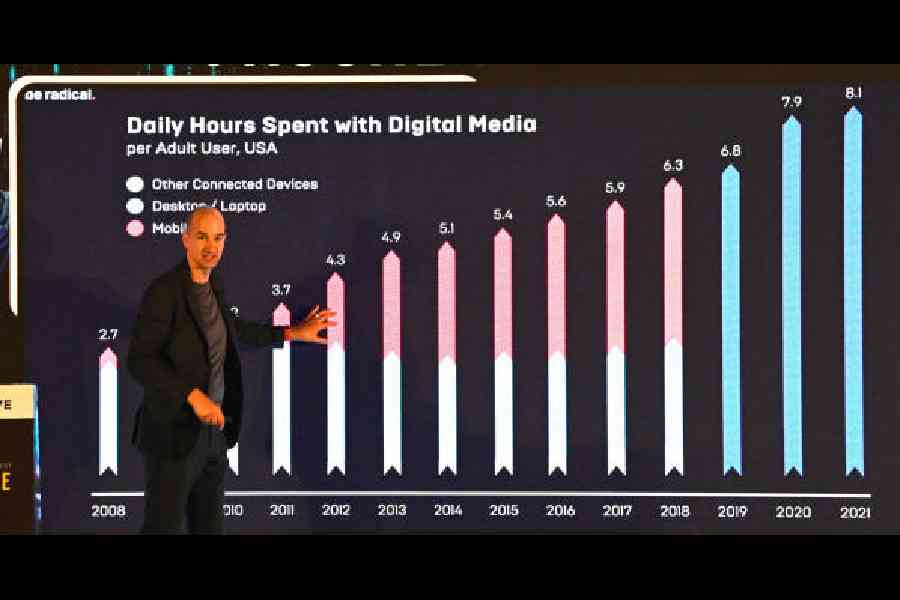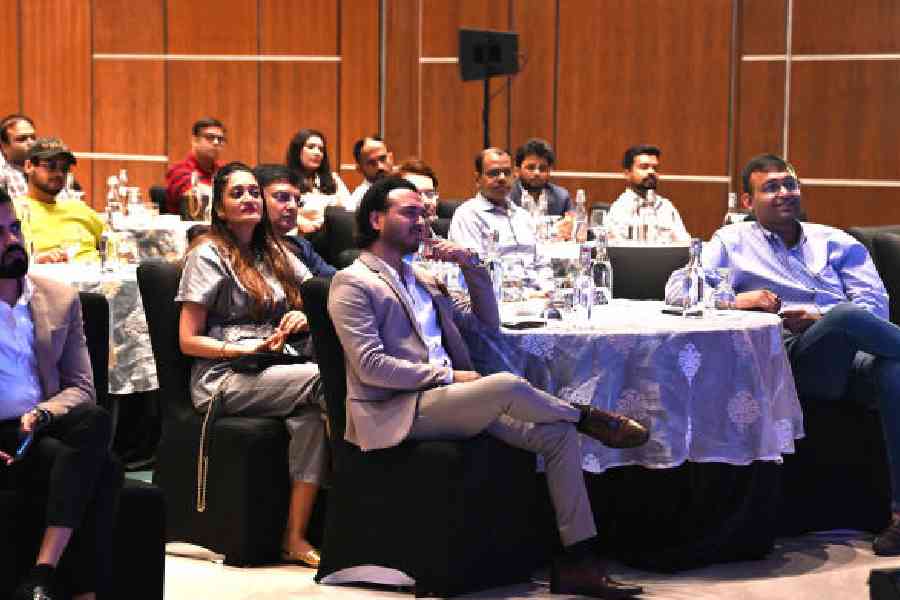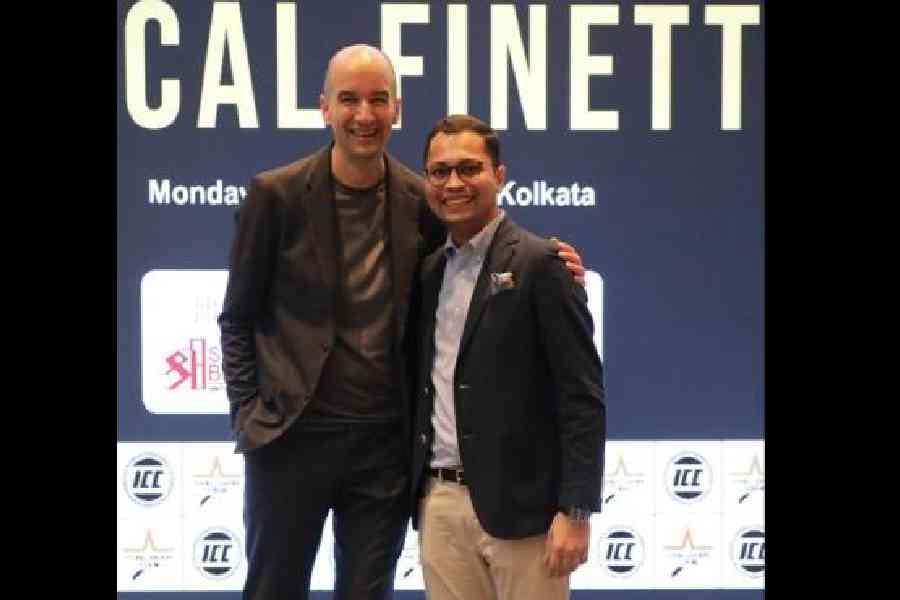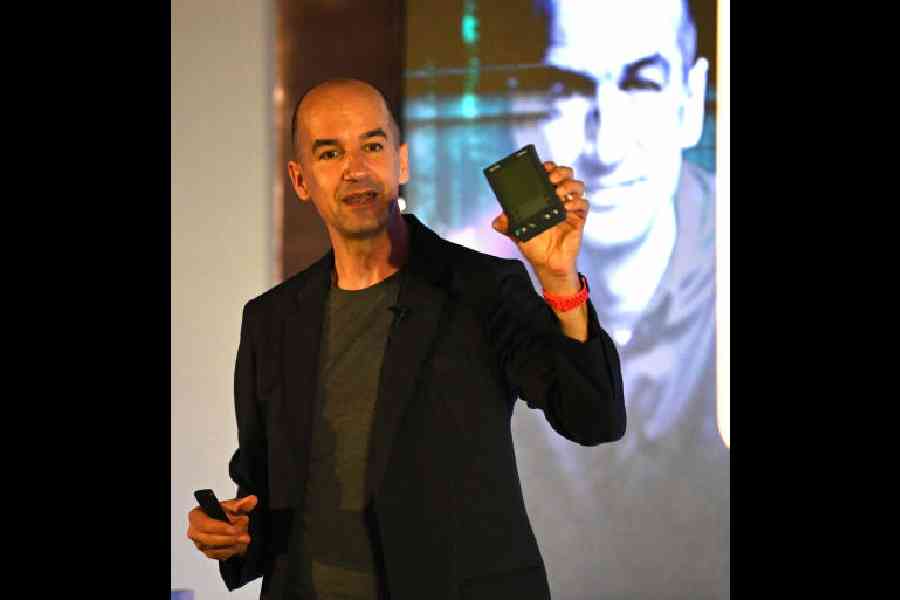Disruption has become an overused word. The problem is when we see the future, we see it through our lenses. Nobody can tell what the future will look like, which presents us with a unique opportunity — we can build the future. Pascal Finette, who has spent a considerable part of his life in the technology industry, has thoughts.
The chief heretic and co-founder of Be Radical said: “Look at the world differently and start asking questions. The question you ask about the world involves how you see the world.”

Pascal Finette believes that it is important for organisations to ask what will not change in the next 10 years
He was recently in Calcutta to speak at a session organised by Young Leaders Forum, Indian Chamber of Commerce. He turned to the words of Guy Kawasaki, Silicon Valley venture capitalist and one of the former Apple employees responsible for marketing the Macintosh line. “As humans we are programmed to see the world in the form of patterns. And we filter out things that don’t fit the pattern. When we see something that is weird, something new, we filter it out. Next time, when you hear a funny story, instead of laughing about it, ask: ‘Isn’t that interesting?’ Start building an inventory in the head,” said Pascal.
Think of the Apple Vision Pro, which is Apple’s new high-tech goggles. Apple is calling it the beginning of an era of “spatial computing”, where digital data blends with the physical world to unlock new capabilities. It has been in the works for a long time but it could have started at a point when there were too many skeptics. And now it’s ready to be delivered early next year, first in the US, followed by other markets (a timeline hasn’t been announced for markets beyond the US).
Speaking on the sidelines of the conference, he touched upon Apple Vision Pro. He told us that the technology has a lot of potential but he doesn’t see a time when the iPhone will disappear. “It will be there because of its power and size. The usage pattern will change.”
“One of the typical concerns about the Vision Pro is the price. It’s $3,500 but it’s a brilliant strategy from Apple. The early adopter crowd for the product would be high-end users who may use the product in commercial settings. Honestly, in such settings it’s not that big a cost for the product you are getting. What Apple built is a reference product. I haven’t seen it but from what you can see online, it’s an incredibly good product. They have set the bar high for others to follow; it will allow them to create experiences that are incredible. And then the product will catch on. Maybe in the future it will be $2,000 and then $1,000. More people will then use it,” he said.
Ask what will not change with time

Any new technology that comes in takes years to reach its peak. It starts slowly and suddenly collects pace. Nobody thought VHS cassettes would one day succumb to DVDs which would succumb to Netflix and streaming. “Ernest Hemingway wrote The Sun Also Rises. There is something called the Hemingway Law of Motion — gradually and then suddenly. It feels for a long time nothing happens, and then boom, you land on the moon even if it takes 30-40 years to happen. That is what happens. It is the world we are living in.”
It will help organisations and entrepreneurs if they look at a concept like 10-10-5: “The top 10 per cent of your organisation should spend 10 per cent of their time thinking at least five years out.” It is also important for organisations to ask what will not change in the next 10 years, which is something Amazon founder Jeff Bezos also believes in.
Pascal recalled a conversation he once had with a funeral director. People will always die, said the funeral director. “The question is: How people will find him and what people will expect of him will change. There is nothing safe anymore. That’s exciting. There is opportunity anywhere and everywhere,” said Pascal.
“The future is unwritten. Nobody can tell what the future will bring, which is weird because you expect people like me to predict what the future would look like. Frankly, we create the future every day. We have the opportunity to make the future creative,” he said. “There is the other side. What if the future has already happened and we are merely catching up to it, particularly when it comes to technology. The PalmPilot came out in 1996-97 and it’s a personal digital assistant. You could put your appointment, your calendar…. it was amazing. Who remembers it? It’s the precursor to the iPhone. But in 1996 did you think there would be something called the iPhone? No. It is hard to see what will be. We need to retrain our brains when we think of the future.”
ORGANISER SPEAK

Arihant Parakh with Pascal Finette
Pascal Finette’s keynote was an absolute game-changer. His insights into the ever evolving landscape of technology and innovation was both enlightening and inspiring. It’s evident that his deep understanding of exponential technologies and their impact on various industries is unparalleled. The way Pascal delved into the concepts of disruption and transformation left a lasting impression on the audience. His ability to connect seemingly disparate trends and ideas showcased his mastery of his subject. One of the highlights was Pascal’s emphasis on the importance of adaptability and predictability. His anecdotes about companies that succeeded by embracing change were not only informative but also empowering. The call to cultivate a growth mindset and continuously seek new opportunities resonated strongly with the audience. Pascal’s engaging delivery style kept everyone captivated throughout the keynote,” said Arihant Parakh, chairperson of ICC Young Leaders Forum.











